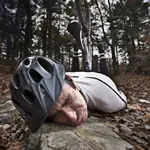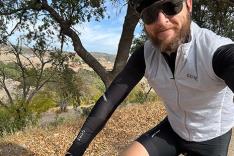
The fear of crashing is a basic, normal—but often hidden—fear for cyclists. The mentally fit cyclist has a variety of healthy ways to cope with the danger inherent in the sport, creating the freedom to experience and enjoy cycling fully.
We've looked at how you can recover quickly from common setbacks in a race or ride: getting dropped, missing the move, puncturing, getting passed, falling short of a goal, and the like. Now, we explore a reality that every cyclist faces—the risk of crashing—and how you can cope effectively with that risk.
More: Do You Need Bike Insurance?
Last month, I was out doing tempo intervals on my favorite flat stretch of country road. Go hard for several minutes, recover, look ahead and back, cross the road, turn around, repeat. Recovering after a hard effort, I spun easily past the entrance to a tiny town square, continued for a few hundred meters, checked ahead and behind, turned around, spun for the few hundred meters, and...a cyclist lay in the middle of the road. I slowed to a stop. I took in the people huddled around her, a long line of sports cars stopped behind her, a distraught man speaking urgently on a cell phone, a crowd starting to gather. I asked myself what I could do. I had no answer. I had an urge to see her face, to see if I knew her, to assess for myself how badly she was hurt. Instead, I turned away.
I made my way over to the small group of onlookers, and saw a friend, a cyclist preparing for the San Francisco to Los Angeles AIDS/Lifecycle ride. She was pale. She explained that just minutes before, the rider had been hit by the lead sports car, which had been making a left turn into the town square. She pointed to the driver: the man on the cell phone.
More: How to Handle a Bike Accident With a Vehicle
I talked with her a bit, and then we fell silent. No reason for me to stay here, I thought. I said goodbye and continued on my way, past the stopped sports cars, and started another interval. As I began, I remembered that police officers often sat in their cars a bit further down the road, radar guns trained on possible speeders. Cell phone reception is spotty out here, I thought; perhaps I could send an officer back to the accident. I sped up. Just then, two fire engines, sirens blaring, sped toward and past me on their way to the scene. I slowed. I forgot about the interval.
Suddenly I was aware of something within me: fear. And in that moment, I became fully human again. I thought: What about the driver? What might it mean to him for a cyclist to listen? I turned around and headed back to the scene.
Such incidents, for many cyclists, raises fears—of crashing, dying—that few want to discuss. And yet: bringing the fears out of hiding, and focusing on healthy ways to cope, is a path to a better experience in the sport we love.
- 1
- of
- 4









Discuss This Article